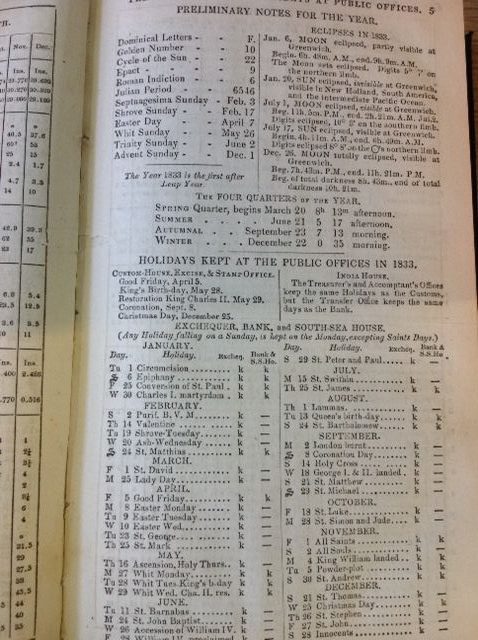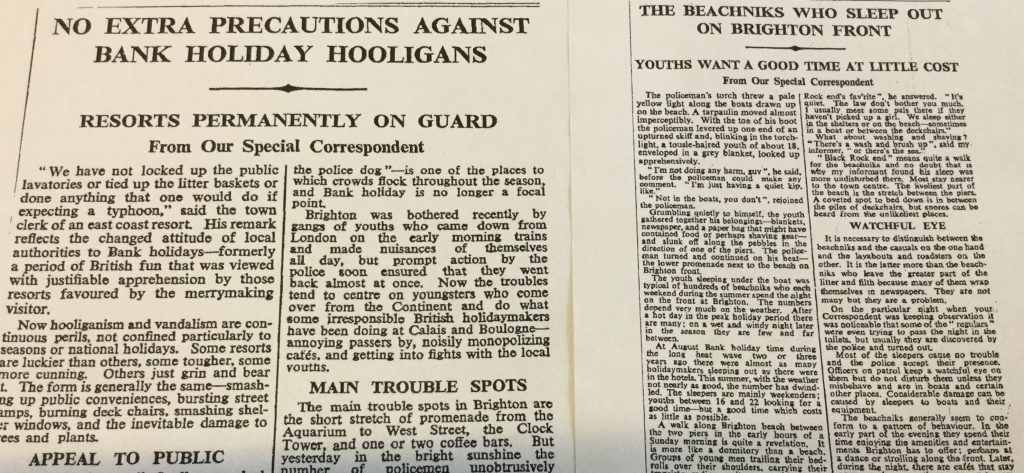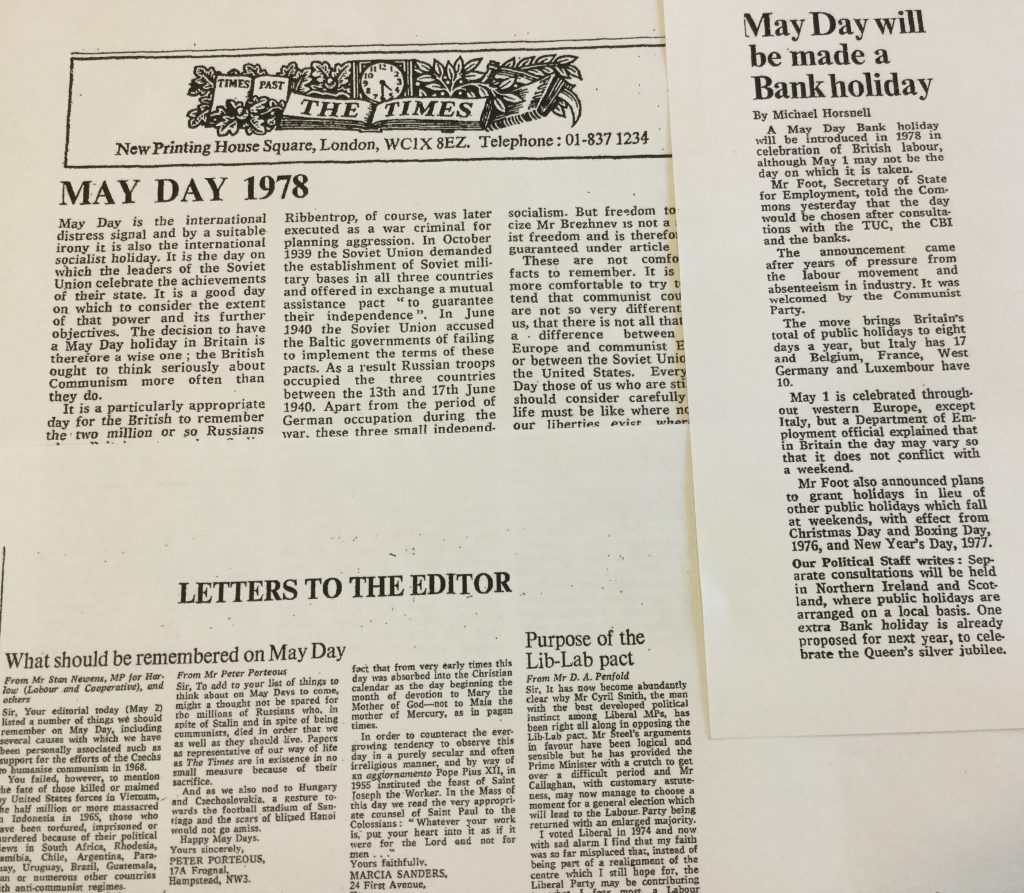The Origins of Bank Holidays
In the UK we owe our statutory bank holidays to John Lubbock, first Baron of Avebury, scientific writer (who studied ants and tried to teach his poodle to read), banker and politician and who, in 1871, drafted the Bank Holiday Bill which, when it became law, created the first bank holidays.
Holy-days and holidays
The first meaning of holiday in the Oxford English Dictionary is: A consecrated day, a religious festival, (now usually written holy-day ). The definition takes its origin from the observance of religious festivals and saint’s days. The second meaning is: A day on which ordinary occupations ( of an individual or a community) are suspended; a day of exemption or cessation from work; a day of festivity, recreation, or amusement. (In early use not separable from sense. 1)
The page from the British Alamanac 1833, below, shows the large number of holidays kept at the Bank of England and the Exchequer, and other public offices. These holidays were to celebrate various royal events, Christian festivals and saint’s days, including London burnt on 2 September, commemorating when the Great Fire of London began.

Local holidays
The tradition of local holidays became even stronger after the industrial revolution when factories in a town would close down, and the whole workforce was then able to go on holiday. For the owners this made economic sense as they saved on the running costs for the time of the closure, and there was no loss of productivity during the rest of the year as the whole workforce was absent at the same time. In northern England and Scotland, and particularly in the mill towns and villages of Lancashire, these holidays were called Wakes weeks and were originally religious celebrations or feasts, held on the saint’s day of the local church, when the rushes that acted as a carpet in the church were renewed. This evolved into a local holiday and celebration when families were reunited, and travelling fairs came to visit. In Scotland each city had its trades fortnight when the tradespeople took their holidays. In Glasgow this coincided with the Glasgow Fair, an annual event, held since the late C12th when the Bishop of Glasgow was granted the right to hold an annual fair by King William I. This long established event became Fair Fortnight after the Second World War and is still going strong in the C21st.
An article from the Glasgow Herald of 12 July 1844 says the following: ‘The annual period “when toil remitting lends its turn to play” has again come around, and Glasgow Fair, according to the want of bygone centuries, has been officially proclaimed by the Magistrates, and is now in full course.’
With the decline in manufacturing, the standardisation of school holidays and the increase in paid holidays for employees these local holidays have died out. However, some organisations such as universities, close down between Christmas and New Year, and magazine publishers often publish double or triple issues so that staff can have a break over the festive period.
Bank Holidays
Statutory bank holidays were introduced by the 1871 Bank Holiday Act and were days when the Bank of England and banks could close. The Act made provision for no financial dealing to occur on that day and bills or promissory notes that were due on that day were not payable until the following day and did not incur any penalties. Before this time banks were unable to close on weekdays as to do so would have put them at the risk of bankruptcy. But once the act was on the statute books, bank staff were able to have fixed holidays. Other employees had more informal arrangements with their employers and took their holidays to fit around the business and trade.
The first bank holidays were Easter Monday, Whit Monday, the first Monday in August and Boxing Day, in England, Wales and Ireland. In Scotland they were New Year’s Day, Good Friday, the first Monday in May, the first Monday in August, and Christmas Day.
Confusingly, there were also public holidays , which are common law holidays that came about through habit and custom, these were Christmas Day and Good Friday in England, Wales and Northern Ireland. Today, the terms public and bank holiday have become interchangeable.
There are also the Movable Feasts. These are holidays which fall according to astronomical events rather than being at a fixed point in the year. Easter is the first weekend after the full moon which occurs on or after the 21 March (often this is the Vernal equinox). For example, in 2017 the full moon falls on Tuesday 11 April and Good Friday is on 14 April. Whit Monday was created as a bank holiday in the 1871 Act and follows Whitsun Sunday, the seventh Sunday after Easter. It is therefore also a movable feast. Whitsuntide was always a popular holiday as it marked the beginning of the summer. Philip Larkin’s poem the Whitsun Weddings celebrates this as he describes a train journey to London and the weddings and holiday activities he saw. It was replaced by Spring Bank Holiday in the 1971 Act and is now always the last Monday in May.
Initially, the Bank Holiday Act of 1871 allowed for the closure of banks and other financial institutions, but as time has gone on businesses, shops (though not generally nowadays except for Christmas Day), local and central government, and schools, colleges and universities have also chosen to close. There is no statutory obligation for them to do so, just as there is no statutory right to have time off on a bank holiday; it is all dependent on what is in an employee’s contract of employment.
In 1971, a hundred years after Luddock’s Bank Holiday Act was passed, the original Act was repealed and incorporated into the Banking and Financial Dealings Act of 1971 which also created some new bank holidays.
Under the 1971 Act and subject to a Royal Proclamation, special days can be appointed as bank holidays (either additional to or in place of bank holidays which fall on a Saturday or Sunday). Additional bank holidays have included the Millennium bank holiday on 31 December 1999 and the Golden Jubilee bank holiday on Monday 3 June 2002.
Bank holidays in the C20th and C21st
In the C20th when workers had far fewer holidays than we do now, and when holidaying abroad was not the norm, bank holidays were of even greater importance and were often a a time for people to head to the seaside, and for drinking and merriment. In the 1960s, the seaside towns of Brighton and Margate saw a spate of holiday violence, often involving young people.

Traffic jams were, and still are, a feature of bank holidays, as are the packed trains and airports. In the 1960s the number of vehicle accidents and road deaths over the holiday period was a cause for concern.

Holidays in Scotland
A 1640 Act of the Parliament of Scotland made the celebration of “Yule vacations” illegal and the same happened in England. It was overturned at the Restoration, and in Scotland the Act was repealed in 1686. Despite this, in part because of the attitude of the church in Scotland, Christmas was effectively suppressed until the 1950s, even though Christmas Day was created as a bank holiday by the 1871 Act. So, while the Victorians were reviving Christmas an introducing cards and Christmas trees in the C19th – traditions which we think of as being far older than they actually are – in Scotland, New Year’s Eve (Hogmanay) was regarded as the main midwinter holiday. The 2 January, or the day following the New Year’s Day bank holiday, was designated a bank holiday by the 1971 Act, again emphasising the importance of the New Year north of the border. Even though the 1871 act created bank holidays in Scotland, and the banks were closed, bank holidays were not regarded as holidays and businesses and local authorities continued with business as usual, and the tradition of local holidays prevailed.

This extract from the Glasgow Herald of 13 December 1875 demonstrates the confusion around about the Act in Scotland.
As well as differences in bank holidays, school holidays and terms are different in Scotland too compared with the rest of the UK. The school year ends in late June and the resumes in mid-August, with a couple of long weekends in February, May and September a mid-term week long break in October.
The Scotland Act 1998 assigns to Scottish Ministers the responsibility for setting bank holidays and legislation was passed in 2007 making it possible to substitute St. Andrews’s Day (30 November) for another bank holiday, though this has not happened yet.
New Year’s Day 1 January
The 1871 Act made this a bank holiday in Scotland but England, Wales and Northern Ireland had to wait until the 1971 Act.
2 January ( Scotland only)
This is only a bank holiday is Scotland, created by the 1971 Act, and reflects the fact that the New Year has always had more significance in Scotland that the rest of the UK.
St. Patrick’s Day (Northern Ireland only)
In 1903, the Bank Holiday (Ireland) Act, added 17 March, Saint Patrick’s Day, as a bank holiday for Ireland.
Good Friday
Initially, this was a public holiday, except in Scotland where it was made a bank holiday by the 1871 act. The 1971 act made it a bank holiday in England, Wales and Northern Ireland.
Easter Monday ( except Scotland)
The 1871 Act made this a bank holiday only England, Wales and Northern Ireland and this was incorporated into the 1971 Act.
May Bank Holiday (first Monday in May)
This was created as a new bank holiday by the Labour government in 1978, in England, Wales and Northern Ireland- the 1871 Act had created it already in Scotland. This caused a controversy with the Conservatives opposition who saw it as linked to International Socialism, despite the fact that there was a long tradition of May Day customs dating back to the Middle Ages. In Scotland the 1871 Act had already made this a bank holiday.

Spring Bank Holiday (last Monday in May)
The 1871 Act created Whit Monday as a bank holiday,(which could fall anywhere between 11 May and 14 June) see above, but it was fixed at the last Monday in May by the 1971 Act.
Battle of the Boyne 12 July (Northern Ireland only)
This bank holiday only occurs in Northern Ireland and commemorates the Anniversary of the Battle of the Boyne in 1690. It was created by the Governor of Northern Ireland in 1926.
August Bank Holiday
First Monday in August ( Scotland only)
The 1871 act created this as a bank holiday in England, Wales Northern Ireland and Scotland. However, beginning in 1965, Edward Heath, then President of the Board of Trade, experimentally changed it to the Monday following the last weekend in August, as a way of extending the holiday season and increasing trade, but this was only in England, Wales and Northern Ireland as the new school year in Scotland began, and still begins, in mid-August.
Last Monday in August ( England, Wales and Northern Ireland)
The 1971 Act permanently changed this bank holiday to the last Monday in August.
St. Andrew’s Day 30 November
The legal framework is in place for this to be a bank holiday in Scotland the future but has not happened yet.
Christmas Day 25 December
Initially, this was a public holiday, except in Scotland where it was a bank holiday in the 1871 act. The 1971 act made it a bank holiday across the whole of the UK.
Boxing Day 26 December
The 1871 Act made this a bank holiday in England, Wales and Northern Ireland and the 1971 Act did so in Scotland
So, as you enjoy your bank holidays during the year give thanks to the first Baron of Avebury*!
[* Lubbock chose Avebury for his title when he became a peer in 1900 as he had fought successfully to save the stone circle in Avebury from destruction.]
Note
The 1971 Act created bank holidays but they did not immediately occur so that the first New Year’s Day bank holiday in England didn’t happen until 1974.
Bibliography
The English Year
British Almanack 1833
Collins Encyclopedia of Scotland
Lancashire Wakes Week, Article from History Today , Vol 24, issue 8, August 1984.
Related link and source material
Article about the Glasgow Fair
Article from the Scotsman, 9 Dec 2013, about New Year and Christmas traditions in Scotland
Banking and Financial Dealings Act 1971
House of Commons Library Briefing Paper SN06170 18 Dec 2015 Bank and Public Holidays
St. Andrew’s Day Bank Holiday Act (Scotland) 2007
Library members can access the entries in the Oxford Dictionary of National Biography and for the people listed above by clicking on the hyperlinks in the text, and can also access the Glasgow Herald, via C19th Newspapers, the Times Digital Archive, and Oxford English Dictionary.
[Fiona Campbell, Library Assistant]
